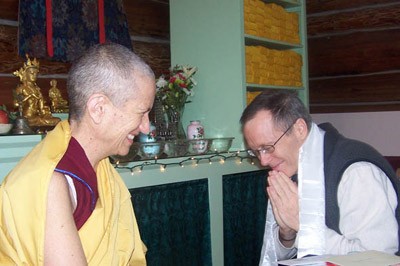The jerk and the potato chips
By J. B.

Okay. Think of your favorite Buddhist movie. Is it Seven Years in Tibet? What about Kundun? Or is it The Little Buddha?
My favorite Buddhist movie is The Jerk. Remember, Steve Martin, the 70s? This movie, I believe, depicts the suffering of attachment and ego with great clarity, compassion, and, of course, humor.
Who can forget Steve Martin’s extreme excitement the day the new phone books were delivered? He eagerly flipped through the pages until finally finding his name in print. A perfect example of our craving for recognition, one of the eight worldly concerns.
And what about Bernadette Peter’s statement that gets to the heart of what materialism and grasping are all about, perhaps my favorite movie line of all time. Here’s the scene: Bernadette and Steve, newly wealthy, are entertaining their friends in the basement disco, complete with revolving silver ball, of their mansion. Suddenly, they learn from the news flash on TV that they’ve lost their fortune as a result of a class action suit. As their friends, realizing that their hosts are broke, leave in droves, Bernadette whines, “It’s not the money I’ll miss. It’s all of the stuff!”
Finally, there’s Steve Martin, a broken man, leaving his mansion at the end of the movie, desperately clinging to the remnants of his wealth, grabbing bits of stuff. “All I need is this ashtray. That’s all I need. And this chair. All I need is this chair and this ashtray. That’s all I need. And this…”
Adrift in samsara, our ignorance makes us susceptible to the bane of attachment. We cling to whatever will give us the illusion of happiness and permanence: material goods, wealth, relationships, reputation, ego. Our attachment to these worldly concerns only prolongs our suffering in samsara.
Throughout my life, I have at various times been extremely attached: addicted to alcohol, money, sex, chocolate, cigars, coffee, Fritos, a convertible sports car, television, potato chips, worrying, and French toast with powdered sugar and butter on top, which was my regular breakfast for two years when I worked at a pancake house at college. Through my practice of Buddhism, I am finally aware of my attachment to worldly concerns and the resulting suffering. I’m also aware of all the suffering from attachment in the world. I live in a gated community of extreme “cling-ons” (Get it? Star Trek?) prison. We are all here because we desired something someone else had and we did not have; or because we wanted more of something we already had; or perhaps we perceived that someone hurt us, damaged our ego or reputation, and wanted to even the score. Is there a connection between our society’s rampant materialism and our ever-increasing prison population?
In our youth, we are indoctrinated with the idea that “stuff” will make us feel better, that food, drink, or drugs will make us happy. Designer label clothes will make me feel better. If I only had that new Porsche I’d be happy. Perhaps we do feel better for a short time, but it doesn’t last. Soon, we need the imported Swiss dark chocolate instead of Hershey’s, or the latest video game system, or another new, shinier car. We become caught up in the spiraling cycle of satisfying our insatiable desires. It’s a losing battle.
You might think coming to prison, which entails losing all your possessions, your reputation, your friends, would cure you of clinging. But, it doesn’t. You cling on. Guys here cling mostly to their image, usually trying to create an intimidating, tough-guy persona by strutting around scowling. They’ll spend hours doing push ups and pull ups, building up their biceps so they look even more intimidating, more threatening.
As for me, I recently had an issue with potato chips. Every other week, when we have cheeseburgers, the chow hall serves little bags of potato chips. I love potato chips (see above list of addictions). Well, one of my friends started giving me his bag of chips. Then another friend began giving me his bag. It was pure ecstasy! Three bags of chips, all for me. I started eagerly looking forward to “potato chip day” when I could chow down on three bags of potato chips.
Then one day, my chip-enabling friend and I sat down for lunch. I anxiously looked across the table at the bag of chips sitting on his tray. As I sat drooling, he opened up the bag and dumped the contents into his soup. He noticed my stunned look of horror I’m sure. “Sorry,” he said, “I like to put barbecue chips in my soup.”
I took a deep breath. I’d be okay, my other friend would soon be around with his bag of chips. But when he sat down, there were no chips on his tray. Panicked, I asked about his chips. “I forgot, I gave them to someone else,” he replied, looking at me in pity. I looked down depressingly at my almost empty bag of chips as I munched one of my few remaining chips. My comfortable, three-bag-o’-chips world had been shattered.
As I sat down to meditate that night, I thought about that episode and that right there with those potato chips was a perfect lesson in the desirous nature of samsara. Before my friends had started giving me their bags of chips, one bag was enough for me, I munched away happily. But then, there were two bags, then three. Just one bag wasn’t enough anymore, I didn’t enjoy one bag, I needed more. I was full of anticipation and yes, desire. I’d wake up in the morning on “chip day” eagerly looking forward to lunch and my three bags of chips. I had once again become a victim of the sensual nature of samsara.
We cycle through samsara over and over, striving to be happy, but never truly realizing that goal. Until we gain the wisdom of the true nature of our suffering, impermanence, and selflessness we are doomed to a shallow, meaningless existence. First, we must accept completely the four noble truths; this enables us to understand our suffering and realize that we can overcome it by following the path the Buddha laid out. By contemplating and meditating on emptiness and selflessness we are liberated from our craving. We see that all phenomena are transient and essence-less, and we no longer cling to an inherently existent self. Now we can fully understand the suffering of others, develop compassion, and finally be of service to all sentient beings, finding true happiness at last.
It’s not easy. Much work is involved to break our cyclic ways. I think of the powerful influence a bag of potato chips had over me. How do we stand a chance against the shiny, colorful, sexy “stuff” of samsara?
We can be courageous and faithful, follow the Buddha’s path and discover true bliss. Or, like the jerk, we can stumble through life, grasping at all of the stuff. It’s our choice.
Incarcerated people
Many incarcerated people from all over the United States correspond with Venerable Thubten Chodron and monastics from Sravasti Abbey. They offer great insights into how they are applying the Dharma and striving to be of benefit to themselves and others in even the most difficult of situations.


